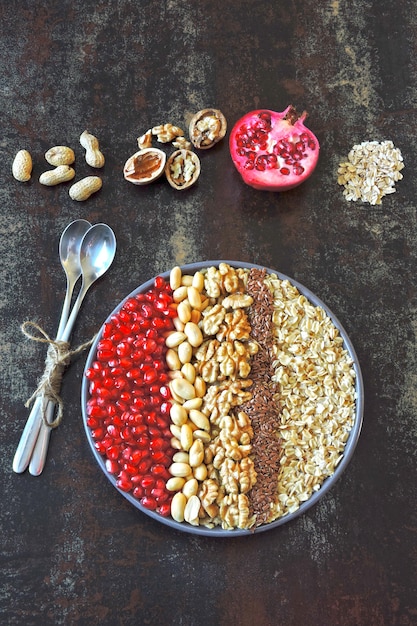Is Your Diet Stressing You Out? 5 Food Swaps for a Better Mood

Is your diet contributing to your stress? It’s possible. Certain foods can exacerbate stress, while others can help to alleviate it. Making simple food swaps can improve your mood and overall well-being.
Are you feeling stressed lately? Believe it or not, your diet might be playing a bigger role than you think. Let’s explore how your food choices can impact your stress levels and discover some easy food swaps to improve your mood.
The Gut-Brain Connection: How Food Affects Stress
The gut-brain connection is a fascinating and increasingly understood area of research. It highlights the intricate communication network between your digestive system and your brain. What you eat directly impacts your gut microbiome, and this, in turn, influences your mood, stress levels, and overall mental well-being.
The Role of the Microbiome
Your gut is home to trillions of bacteria, fungi, and other microorganisms, collectively known as the gut microbiome. This complex ecosystem plays a vital role in digestion, immunity, and even mental health. A balanced and diverse microbiome is essential for optimal functioning.
Inflammation and Stress
An unhealthy diet high in processed foods, sugar, and unhealthy fats can disrupt the balance of the gut microbiome, leading to inflammation. Chronic inflammation has been linked to various mental health issues, including anxiety and depression, which can exacerbate stress. Eating anti-inflammatory foods can help to counter this effect.

- Balanced Gut Microbiome: Supports the production of neurotransmitters like serotonin, which regulates mood.
- Inflammation Reduction: Reduces systemic inflammation, lowering the risk of mental health issues.
- Nutrient Absorption: Enhances the absorption of essential nutrients that support brain function.
- Stress Hormone Regulation: Helps regulate the stress response by modulating the hypothalamic-pituitary-adrenal (HPA) axis.
In summary, the gut-brain connection underscores the importance of a healthy diet for managing stress. By nourishing your gut with the right foods, you can support your mental well-being and improve your ability to cope with stress.
Swap #1: Processed Snacks for Whole Foods
Processed snacks, such as chips, cookies, and candy, are often high in sugar, unhealthy fats, and artificial additives. These can lead to blood sugar spikes and crashes, contributing to mood swings and increased stress levels. Swapping these for whole foods can provide stable energy and nutrients.
What are Whole Foods?
Whole foods are foods that are minimally processed and retain their natural nutrients. They include fruits, vegetables, whole grains, legumes, nuts, and seeds. These foods are packed with vitamins, minerals, and fiber, which are essential for maintaining a healthy body and mind.
Benefits of Whole Foods
Incorporating more whole foods into your diet can have numerous benefits for stress management. They provide sustained energy, support a healthy gut microbiome, and offer essential nutrients that promote brain function. This means you’ll feel more balanced and better equipped to handle stress.
- Energy Stability: Provides sustained energy throughout the day, preventing energy crashes and mood swings.
- Nutrient Richness: Packed with essential vitamins and minerals that support brain function and reduce stress.
- Gut Health: Supports a healthy gut microbiome, which is crucial for mental well-being.
- Reduced Inflammation: Lower in processed ingredients that can cause inflammation and exacerbate stress.
By replacing processed snacks with whole foods, you can stabilize your blood sugar, nourish your body with essential nutrients, and support a healthy gut microbiome. These changes can significantly impact your stress levels and overall mood.
Swap #2: Sugary Drinks for Water or Herbal Tea
Sugary drinks, like soda and juice, are loaded with sugar and artificial sweeteners. These can cause rapid spikes in blood sugar, leading to energy crashes and increased anxiety. Swapping them for water or herbal tea can help regulate blood sugar and promote relaxation.
The Downside of Sugary Drinks
Sugary drinks not only contribute to weight gain and other health problems but can also negatively impact your mental health. The rapid fluctuations in blood sugar can cause mood swings, irritability, and increased feelings of stress.
Benefits of Water and Herbal Tea
Staying hydrated is essential for overall health and can help regulate stress hormones. Herbal teas, such as chamomile and lavender, have calming properties that can promote relaxation and reduce anxiety. They provide a soothing alternative to sugary drinks.

- Hydration: Maintains proper bodily functions and helps regulate stress hormones.
- Blood Sugar Regulation: Prevents rapid spikes and crashes in blood sugar, stabilizing mood and energy levels.
- Calming Effects: Herbal teas like chamomile and lavender have natural calming properties.
- Antioxidant Benefits: Many herbal teas are rich in antioxidants, which protect against oxidative stress.
Switching from sugary drinks to water or herbal tea is a simple yet effective way to reduce stress and improve your overall mood. By staying hydrated and choosing calming beverages, you can support your mental well-being throughout the day.
Swap #3: Caffeine Overload for Moderation
Caffeine can be a double-edged sword when it comes to stress. While it can provide a temporary energy boost, excessive caffeine consumption can lead to anxiety, jitteriness, and sleep disturbances. Moderating your caffeine intake is crucial for managing stress.
The Effects of Caffeine
Caffeine stimulates the central nervous system, which can increase alertness and improve focus. However, it can also trigger the release of stress hormones like cortisol, exacerbating feelings of anxiety. Finding the right balance is key.
Tips for Moderation
Pay attention to how caffeine affects you personally. Some people are more sensitive to its effects than others. Try to limit your intake and avoid consuming caffeine later in the day to prevent sleep disturbances. Consider decaffeinated options or herbal teas as alternatives.
- Limit Intake: Avoid excessive consumption of caffeine, especially later in the day.
- Monitor Sensitivity: Pay attention to how caffeine affects your anxiety and stress levels.
- Choose Alternatives: Opt for decaffeinated coffee or herbal teas with calming properties.
- Hydrate: Drink plenty of water to counteract the diuretic effects of caffeine.
Moderating your caffeine intake can help regulate your cortisol levels, prevent anxiety, and improve your sleep quality. By being mindful of your consumption, you can harness the benefits of caffeine without experiencing its negative side effects.
Swap #4: Refined Grains for Whole Grains
Refined grains, such as white bread and pasta, are processed to remove the bran and germ, which contain essential nutrients and fiber. These grains can cause rapid spikes in blood sugar, leading to energy crashes and mood swings. Swapping them for whole grains provides sustained energy and supports gut health.
The Difference Between Refined and Whole Grains
Whole grains, such as brown rice, quinoa, and whole wheat bread, retain their natural nutrients and fiber. This means they are digested more slowly, providing a steady release of glucose into the bloodstream. This helps to stabilize energy levels and prevent mood swings.
The Benefits of Whole Grains
Incorporating more whole grains into your diet can improve your overall health and well-being, reduce stress levels, and provide long-lasting energy. They are also a good source of B vitamins, which play a crucial role in nerve function and stress management.
- Sustained Energy: Provides a steady release of energy, preventing blood sugar spikes and crashes.
- Nutrient Richness: Contains essential vitamins, minerals, and fiber that support overall health.
- Gut Health: Promotes a healthy gut microbiome, which is essential for mental well-being.
- Reduced Inflammation: Lower in processed ingredients that can cause inflammation and exacerbate stress.
By choosing whole grains over refined grains, you can stabilize your blood sugar, nourish your body with essential nutrients, and support a healthy gut microbiome. These changes can contribute to improved mood and reduced stress levels.
Swap #5: Unhealthy Fats for Healthy Fats
Unhealthy fats, such as those found in fried foods and processed snacks, can contribute to inflammation and negatively impact brain function. Swapping them for healthy fats, like those found in avocados, nuts, seeds, and fatty fish, can support brain health and reduce inflammation.
The Importance of Healthy Fats
Healthy fats are essential for brain function, hormone production, and overall health. Omega-3 fatty acids, in particular, have been shown to have mood-boosting effects and can help reduce symptoms of anxiety and depression. Aim to include a variety of healthy fats in your diet.
Sources of Healthy Fats
Excellent sources of healthy fats include avocados, nuts, seeds, olive oil, and fatty fish like salmon and mackerel. These foods are rich in omega-3 fatty acids, monounsaturated fats, and other beneficial nutrients that support brain health and reduce inflammation.
- Brain Health: Supports optimal brain function and cognitive performance.
- Mood Enhancement: Omega-3 fatty acids have mood-boosting effects and can reduce symptoms of anxiety.
- Inflammation Reduction: Reduces systemic inflammation, lowering the risk of mental health issues.
- Nutrient Absorption: Enhances the absorption of fat-soluble vitamins and other essential nutrients.
Replacing unhealthy fats with healthy fats is a crucial step in managing stress and supporting your mental well-being. By incorporating these foods into your diet, you can improve brain function, reduce inflammation, and enhance your mood.
| Key Swap | Brief Description |
|---|---|
| 🍟➡️🍎 Processed Snacks to Whole Foods | Swap sugary, processed snacks for fruits, veggies, and nuts. |
| 🥤➡️💧 Sugary Drinks to Water/Tea | Replace sodas and juices with water or calming herbal teas. |
| ☕➡️🌿 Caffeine Overload to Moderation | Limit caffeine intake, especially in the afternoon. |
| 🍞➡️🌾 Refined to Whole Grains | Choose brown rice, quinoa, and whole wheat over white bread and pasta. |
Frequently Asked Questions (FAQ)
▼
Yes, absolutely. The food you eat impacts your gut health, which in turn affects your brain function and stress response. Poor diet choices can exacerbate stress, while healthy choices can help alleviate it.
▼
Some people may notice a difference within a few days, while others may take a few weeks. Consistency is key, and it’s important to listen to your body and observe how you feel.
▼
Minimizing processed foods, sugary drinks, and excessive caffeine can make a big difference. Focus on whole, nutrient-dense foods and aim for a balanced diet.
▼
Yes, many of these food swaps can help with both stress and anxiety. A healthy diet supports brain function and can help regulate mood, which can alleviate anxiety symptoms.
▼
Adapt these food swaps to suit your individual needs. Consult with a healthcare professional or registered dietitian to create a personalized plan that addresses your specific concerns.
Conclusion
Making simple food swaps to improve your mood and reduce stress can have a profound impact on your overall well-being. By focusing on whole foods, limiting processed items, and prioritizing healthy fats, you can support your brain health and enhance your ability to cope with stress. Remember, small changes can lead to big results.





